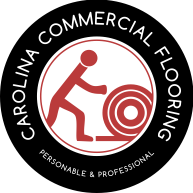If you’ve been shopping for new floors, you’ve probably noticed two popular options that look almost identical: laminate flooring and luxury vinyl plank (LVP) flooring. Both mimic the look of hardwood or even tile, both come in planks, and both are marketed as durable, affordable choices.
It is easy to confuse the two because of their many similarities.
But, at their core, they are different…
Laminate and vinyl flooring are made from very different materials, which affects how they perform in your home.
This guide breaks it all down so you can choose the flooring option that best fits your lifestyle, family, and budget.
And, if you still have questions, give us a call.
Let’s get started.
What Is LVP (Luxury Vinyl Plank Flooring)?
Luxury vinyl plank flooring, sometimes just called LVP, is a type of vinyl flooring designed to look like real hardwood flooring or tile.
Let’s nerd out a bit…
- How it’s made: LVP is built from multiple layers of PVC vinyl, with a printed design layer that mimics wood or stone, topped with a clear wear layer that protects against scratches and stains.
- Waterproof advantage: Most types of vinyl flooring, including LVP, are completely waterproof, making them ideal for kitchens, bathrooms, and basements.
- Underfoot feel: LVP tends to feel slightly softer and warmer underfoot than tile or hardwood, especially when paired with underlayment.
In short, LVP is durable, moisture-resistant, and versatile, a strong contender if you want a realistic wood look without the worries of water damage.
What Is Laminate Flooring?
Laminate flooring has been around longer than LVP and remains a favorite for homeowners who want the look of wood at a lower cost.
- How laminate flooring is made: Laminate planks have a core made from compressed wood fibers (HDF), topped with a printed image that mimics wood or tile, and sealed with a tough wear layer.
- Water resistance: Unlike LVP, traditional laminate is not waterproof. However, many new laminate floor products now come with water-resistant or even “waterproof-rated” technology for short spills.
- Underfoot feel: Because of the dense wood fiber core, laminate planks tend to feel more rigid and closer to the firmness of hardwood flooring.
In short: Laminate is budget-friendly, highly scratch-resistant, and a great choice in areas where moisture is not a big concern.
Quick Comparison: LVP vs. Laminate Flooring
| Feature | LVP (Luxury Vinyl Plank) | Laminate Flooring |
| Waterproof | Yes | No (water-resistant only) |
| Durability | Great against water, moderate against scratches/dents | Excellent scratch resistance, can swell with moisture |
| Thickness | 4–8mm | 8–12mm |
| Underfoot Feel | Softer, warmer | Harder, closer to hardwood |
| Wear Layer | Clear vinyl wear layer | Aluminum oxide/melamine |
| Installation | Floating floor, easy DIY | Floating floor, easy DIY |
| Best Rooms | Kitchens, bathrooms, basements | Living rooms, bedrooms, hallways |
| Cost | Mid-to-high | Budget-to-mid |
Absolutely — tables make it easier for homeowners to skim and compare. Here’s the updated Pros & Cons section with clear side-by-side tables:
Pros & Cons of Each Flooring Type
LVP (Luxury Vinyl Plank Flooring)
| Pros | Cons |
| 100% waterproof | Can dent under heavy objects |
| Realistic wood and tile designs | Slightly more expensive than laminate |
| Softer, quieter underfoot | Lower-quality LVP may look less authentic |
| Easy to install over most subfloors | |
| Low maintenance |
Laminate Flooring
| Pros | Cons |
| Extremely scratch-resistant (great for pets and kids) | Not fully waterproof—risk of swelling if exposed to moisture |
| Budget-friendly flooring option | Can be noisier without underlayment |
| Feels closer to hardwood underfoot | Limited use in bathrooms or basements |
| Wide variety of looks and styles |
Which Flooring Option Is Right for You?
When deciding between laminate and vinyl flooring, think about your home’s needs:
- For families with kids or pets: Laminate offers top-notch scratch resistance.
- For moisture-prone areas: LVP wins with full waterproof protection.
- For comfort underfoot: LVP feels softer and warmer than laminate.
- For budget-friendly updates: Laminate is usually the more affordable choice.
- For a whole-home solution: Many homeowners mix both—LVP in kitchens/baths and laminate in bedrooms/living rooms.
Which one is best for you?
Both laminate and vinyl flooring offer stylish, durable alternatives to traditional hardwood flooring or tile. The key difference comes down to water resistance and how each flooring type feels and performs in your daily life.
At the end of the day, the best choice depends on your family’s lifestyle, your budget, and the rooms you’re updating.
We can help you with this decision so you know all your options.Contact us today to schedule a free consultation and discover the perfect floors for your space.
